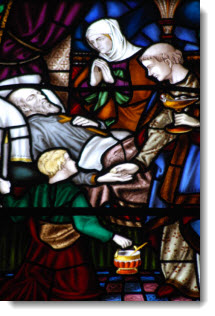 Anointing of the Sick
Anointing of the Sick
The sacrament of Anointing of the Sick is given to those who are seriously ill by anointing them on the forehead and hands with duly blessed oil—pressed from olives or from other plants—saying, only once: "Through this holy anointing may the Lord in his love and mercy help you with the grace of the Holy Spirit. May the Lord who frees you from sin save you and raise you up." (Catechism of the Catholic Church, 1513)
- Anointing of the Sick includes (CCC 1519):
- The laying on of hands by the priest.
- Prayer over the person “in the faith of the Church.”
- Anointing with oil blessed by the bishop.
- This sacrament has a powerful effect upon the sick person (CCC 1520-21):
- Strengthening, peace and courage to overcome the difficulties that go with the condition of serious illness or the frailty of old age”
- “Healing of the soul, but also of the body if such is God's will.
- Forgiveness of sin.
- “Union with the passion of Christ.” One’s suffering becomes “a participation in the saving work of Jesus.”
- Allows the sick person, by their suffering, to "contribute to the good of the People of God," building up the holiness of the Church and all people.
- “A preparation for the final journey.”
This sacrament is primarily intended for any who suffer from serious or chronic physical or emotional illness or who struggle with the infirmities of age. One need not be in danger of death nor does the Church anoint one who has already died.
"Is any among you sick?
Let him call for the presbyters of the Church, and let them pray over him,
anointing him with oil in the name of the Lord;
and the prayer of faith will save the sick man, and the Lord will raise him up;
and if he has committed sins, he will be forgiven".
--James 5:14-15